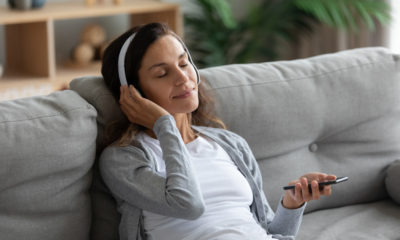6 Ways to Be Less Anxious and More Present
Discover how to be less anxious and become more productive and successful.
Learn to be more present and feel:
- calmer
- more in control
- happier and more connected
Because the present is all we have, every precious second and nano-second is ours to do with it what we want.
However, that only happens when we live in the now mentally and exert control over our thoughts and feelings.
Being more present is a good two-for-one deal in that it both helps decrease anxiety and increase pleasure.
Here’s how to stop feeling anxious to be light and free.
Six ways to make you less anxious
1. Check in with yourself often
Several times during the day, no matter what’s going on, ask yourself, “How am I feeling?”
Hopefully, the answer will be that you’re doing just fine.
The point of this inquiry is to ground you in the now.
My guess is that frequently when you ask this question, you’ll be pulling yourself back to the present from thinking about the past or future.
Maybe you’re worried about that pay raise discussion you’re scheduled to have with your boss, anxious about a blind date or upcoming presentation, or ruminating about the argument with your partner earlier in the day.
Much of the time, we are doing okay emotionally.
Life in most moments may not be thrilling or grand, but it’s usually not the pits.
Even when we’re doing tasks we dislike, or are not feeling particularly well, we can always feel better.
We do this by paying attention to what is going well for us.
The presentation or date may turn out terribly, but now can still be pretty okay if you let it be.
The morning’s argument with your partner or last week’s fender bender may have repercussions down the road, but right this moment, your life is likely running smoothly.
2. Recognize the purpose of anxiety
Anxiety is rooted in a perception of a physical or emotional threat to self.
The key word here is perception.
If you’re going to a party you’ve been dying to attend for ages; you’ll feel differently about it than if your partner is dragging you to this same party.
Anxiety is an evolutionary inner experience that helps us survive.
It has no other function.
When it works optimally, it keeps us alive and thriving.
When it doesn’t, it shoves us mentally into the future and out of the physical present.
Being anxious differs from fear.
The latter is an automatic physiological response to danger.
A lion charges at you outside the tour bus on a Safari, and without thinking, you dash toward the bus door to scramble to safety.
Your house alarm clangs at 2 a.m., and your heart beats wildly.
Although you may have physical sensations along with anxiety, that is not the same as having fear.
Anxiety comes from thoughts about the future that cause discomfort, not actual impending harm.
Knowing the difference between fear and anxiety helps keep you present.
The good news is that if you’re in a genuinely scary situation, you can trust that fear will automatically take over to keep you safe.
3. Worry (aka anxiety) is useless
The thought is if we worry enough, we can somehow fashion the future to our liking when we get there.
It has a magical time travel appeal: If I think about something enough now when the time comes for it to happen, all will be well.
You try to expect everything that could go wrong ahead of time—on your wedding day, starting a new job, at the big bash you give every year for your employees, on a date with someone you have a crush on, driving to another state to visit a friend—to get everything set up ahead of time so that when you get to the future, nothing will go wrong.
In the back of our minds, we know we can’t control life and end up depending on worry to give us a leg up on achieving success.
We assign worry undeserved power, give our thoughts about the future a life of their own, and believe they can shape our destiny for the better.
We worry because it feels better than doing nothing and experiencing helplessness, futility, or despair.
Worry is how we combat that awful feeling that things often don’t and won’t go our way.
But mostly, we worry because it’s become a habit.
We don’t realize that it’s unnecessary, harmful, and a waste of time.
4. Worrying is not problem-solving
Worrying is a misguided attempt to become less anxious which takes place in a closed mental loop and produces more of itself.
It’s an internal process, an intra-psychic phenomenon.
Thoughts race around in circles like a dog chasing its tail, getting nowhere.
We imagine various scenarios and outcomes, but our agita remains, so we redouble our efforts to produce more or better solutions.
The process is like trying to know what the weather is like when you’re indoors.
You can’t.
You need to step outside to find out.
Problem-solving occurs outside your mind in the real world where the problems are.
For the best solutions, you’ll want to intentionally develop strategies to solve problems, develop coping skills, and prepare yourself with many Plan Bs.
However, you can’t know if strategies will succeed (and eliminate anxiety) until you’ve tested them where problems are happening in the world.
Taking your show on the road is the only way to ascertain if your ideas are winners.
5. Mindfulness increases attention to now and makes us less anxious
There is nowhere we can ever be physically other than in the present.
When our minds drift back to the past or catapult into the future unintentionally, we lose touch with the current moment.
To thwart this dynamic, pay attention to what you’re doing, whether it’s washing dishes or filling your gas tank, whether you’re stuck in traffic or waiting for an appointment at the dentist.
Remain present by looking around and noticing the details of your surroundings.
Keep your thoughts from drifting toward future events when doing an important task.
Live life one experience or moment at a time.
The problem with chronic anxiety is that even when we get to whatever point in the future we’ve been anxious about, we’re still not present.
Because by then, we’re anticipating and trying to project control over the next situation or the one after that.
By being mindful, we experience life to its fullest extent moment by moment.
6. Focus on your senses to stay present
The antidote to being less anxious and connecting to now is to focus on your senses: touch, taste, sight, smell, and hearing.
By grounding ourselves sensorially, we shift from trying to control the future to simply being in the now.
Ask these five questions to anchor yourself in the present and feel less anxious
What do I see?
Inspect the world around you.
You’re here and not stuck in a time warp.
Call what you see by name and describe it.
Take a detailed mental snapshot.
In my office, a client might say: “I see you in your brown chair, the woodsy picture over your desk, and the ceiling fan.”
What do I hear?
Tune in to sounds around you.
Don’t just settle for the first ones you notice; strain to identify background noises such as distant voices, cars driving by, or the whir of an air-conditioner.
If you don’t hear any threats, relax, and enjoy the moment.
What do I smell?
To ground yourself in the present, sniff the air or take a deep breath.
You’ll be surprised what lingers in it: perfume, auto exhaust, perspiration, cooking odors.
Breathing deeply (in clean air) will also help you relax.
What am I sensing through touch?
Notice tactile sensations.
Imagine being fastened to the present and the earth.
Your feet are firmly planted on the ground.
You’re sitting in a chair or lying on a bed.
What textures do you feel?
Are they smooth or rough, hot or cold, soft or hard?
What am I tasting?
Mindful eating is crucial to staying connected to appetite cues and eating what our bodies enjoy and need for nourishment.
When you’re anxious, you may turn to food.
If you’re anxious while eating, consciously shift your focus to how food tastes, its odor and texture, and how it feels in your body.
If you’re anxious when you’re not hungry, don’t confuse wanting food with comfort.
Find other ways to shut off your agita.
What actions are you taking to become less anxious?
To be less anxious and more present, you’ll need to take a two-pronged approach to change.
This involves actively and intentionally turning off your “what if?” thoughts by simply noticing but not attaching to them, distracting yourself with more pleasant thoughts, or taking positive actions.
It also involves shifting your mental energy away from the future and what’s happening inside your mind and purposely becoming entirely absorbed in the present moment.
You’ll learn how to do both with practice, and the better you get with one endeavor, the better you’ll do with the other.
What actions are you taking to become less anxious?
We’d love to hear all about it in the comment section below.












Kapil
May 10, 2019 at 11:23 AM
stress is chief cause of worry.
Its really imporatnt to live in present to make life worth.
type of difficulties in human life
Pauline Lozoya Hocking
May 9, 2019 at 1:50 PM
I am currently supporting a lot of people who are anxious because of finding about how bad a state the planet is in. I have tried to suggest mindfulness as a way to 1) make sure we do act in the here and now and don’t become paralysed by fear. 2) encourage people to still enjoy the present. It is still a beautiful world. Thank you for this.. I will forward it to those I am supporting, as well as reminding myself of the reasons worrying is pointless. <3
Sunday
March 2, 2019 at 6:57 AM
Am actually kinda anxious this days. Thanks, these tips help.
Matt Mortensen
February 6, 2019 at 2:18 PM
I am always looking for ways to be more present and in-the-moment! This is great advice!